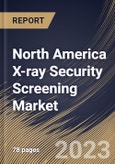The X-ray security screening market has advanced quickly, and new technology has improved usability, speed, and safety. Beyond industrial applications, X-ray security screening systems have expanded due to the considerations above. In addition, the effectiveness of X-ray security systems has been greatly improved by technological developments in hardware, like detectors and tubes, as well as software modifications. At the moment, modernizing current security screening facilities offers opportunities for the market's expansion.
These X-ray security scanners can identify metallic or non-metallic things with low radiation penetration. With greater international traffic in goods and emerging security risks in many industries, security has elevated to the top of the priority list. The event management, law enforcement, lodging, and dining, as well as the transportation sectors, are all expanding quickly. The need for X-ray security scanners in the market is being driven by the anticipated expansion of the goods trade.
Security screening products have been in high demand in recent years due to increased terrorist threats. Individuals and their possessions are screened with various security screening equipment, such as explosive trace detectors, electromagnetic metal detectors, and full-body X-ray scanners. Government regulations that promote the installation of screening systems to promote public safety are anticipated to be a significant growth driver. The United States has strict airport security measures; X-ray machines are the most common security screening machinery used at airports. These factors are anticipated to contribute to the expansion of the X-ray security screening market.
The US market dominated the North America X-ray Security Screening Market by Country in 2022, and would continue to be a dominant market till 2029; thereby, achieving a market value of $1,408.2 million by 2029. The Canada market is poised to grow at a CAGR of 10% during (2023-2029). Additionally, The Mexico market should witness a CAGR of 9% during (2023-2029).
Based on Application, the market is segmented into Product Screening and People Screening. Based on End-use, the market is segmented into Government, Transit, and Commercial. Based on countries, the market is segmented into U.S., Mexico, Canada, and Rest of North America.
The market research report covers the analysis of key stake holders of the market. Key companies profiled in the report include Teledyne FLIR LLC (Teledyne Technologies Incorporated), Smiths Detection Group Ltd. (Smiths Group plc), Thales Group S.A., Kromek Group plc, NEC Corporation, Leidos Holdings, Inc., Aware, Inc., Bruker Corporation, OSI Systems, Inc. and Analogic Corporation (Altaris Capital Partners)
Scope of the Study
By Application
- Product Screening
- People Screening
By End-use
- Government
- Transit
- Commercial
By Country
- US
- Canada
- Mexico
- Rest of North America
Key Market Players
List of Companies Profiled in the Report:
- Teledyne FLIR LLC (Teledyne Technologies Incorporated)
- Smiths Detection Group Ltd. (Smiths Group plc)
- Thales Group S.A.
- Kromek Group plc
- NEC Corporation
- Leidos Holdings, Inc.
- Aware, Inc.
- Bruker Corporation
- OSI Systems, Inc.
- Analogic Corporation (Altaris Capital Partners)
Unique Offerings
- Exhaustive coverage
- The highest number of Market tables and figures
- Subscription-based model available
- Guaranteed best price
- Assured post sales research support with 10% customization free
Table of Contents
Companies Mentioned
- Teledyne FLIR LLC (Teledyne Technologies Incorporated)
- Smiths Detection Group Ltd. (Smiths Group plc)
- Thales Group S.A.
- Kromek Group plc
- NEC Corporation
- Leidos Holdings, Inc.
- Aware, Inc.
- Bruker Corporation
- OSI Systems, Inc.
- Analogic Corporation (Altaris Capital Partners)








